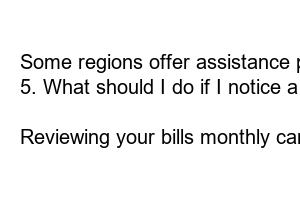상하수도 요금 조회
Water and Sewerage Bill Inquiry: Unveiling the Secrets Behind Your Utility Costs
Have you ever wondered why your water and sewerage bill keeps rising every month? Have you ever wanted to gain a better understanding of how these costs are determined? Look no further! In this comprehensive blog post, we will explore the ins and outs of water and sewerage bill inquiries, shedding light on everything you need to know.
1. What is a Water and Sewerage Bill Inquiry?
A water and sewerage bill inquiry is the process of seeking information about the charges included in your utility bill. It involves understanding how these charges are calculated, what services they cover, and any additional factors that might impact the final amount you are charged.
2. How are Water and Sewerage Bills Calculated?
Water and sewerage bills are calculated based on various factors. These include the amount of water consumed, sewerage disposal costs, service charges, and any additional fees or taxes imposed by the local authorities.
3. Understanding your Water Consumption
Your water consumption is a crucial component in determining your bill. It is primarily measured using water meters installed in your premises. By monitoring and tracking your usage, you can make conscious efforts to reduce your water consumption, which will ultimately reflect positively on your bill.
4. Unveiling the Secrets Behind Sewerage Disposal Costs
Sewerage disposal costs are often a significant part of your bill. These costs cover the service of treating and disposing of wastewater from your property. The calculation is typically based on the water consumption or the size of your property.
5. Decoding Service Charges and Additional Fees
Service charges are fixed fees applied to your bill, covering the maintenance and availability of water and sewerage services. Additional fees can include penalties for late payment or other service-specific charges, such as connecting or disconnecting services.
6. Factors That Impact Your Water and Sewerage Bill
Several factors can influence the final amount you are charged on your bill. These can range from seasonal changes in water consumption to infrastructure upgrades or changes in pricing policies imposed by your utility provider.
7. Effective Ways to Lower Your Water and Sewerage Bills
Looking to save some money on your utility bills? Implementing water conservation techniques, fixing leaky faucets, and upgrading to low-flow fixtures are some of the effective ways to lower your water consumption and consequently reduce your bills.
In summary, understanding your water and sewerage bills involves delving into the intricacies of water consumption, sewerage disposal costs, service charges, and additional fees. By gaining insights into these factors and making conscious efforts to reduce your water consumption, you can lower your bills and save money in the long run.
FAQs
1. How can I inquire about my water and sewerage bill?
Contact your local utility provider’s customer service hotline, visit their website, or check your bill for contact information.
2. Can I dispute charges on my water and sewerage bill?
Yes, if you believe there is an error or discrepancy in your bill, you can contact your utility provider’s customer service to discuss the issue.
3. What are some common reasons for an unusually high water bill?
Common reasons include undetected leaks, faulty meters, or changes in the pricing structure imposed by the utility provider.
4. Are there any government programs or initiatives to help lower water and sewerage bills?
Some regions offer assistance programs, rebates, or incentives to promote water conservation and help residents reduce their bills. Check with your local government for available options.
5. What should I do if I notice a sudden increase in my water consumption?
If you notice a significant increase in your water consumption without any apparent reason, it is advisable to check for leaks or contact a professional plumber to investigate the issue.
6. How often should I review my water and sewerage bills?
Reviewing your bills monthly can help you track your consumption patterns and catch any discrepancies or unusual spikes in your charges.

